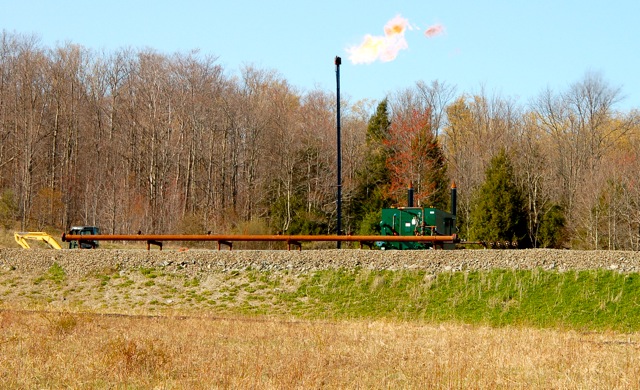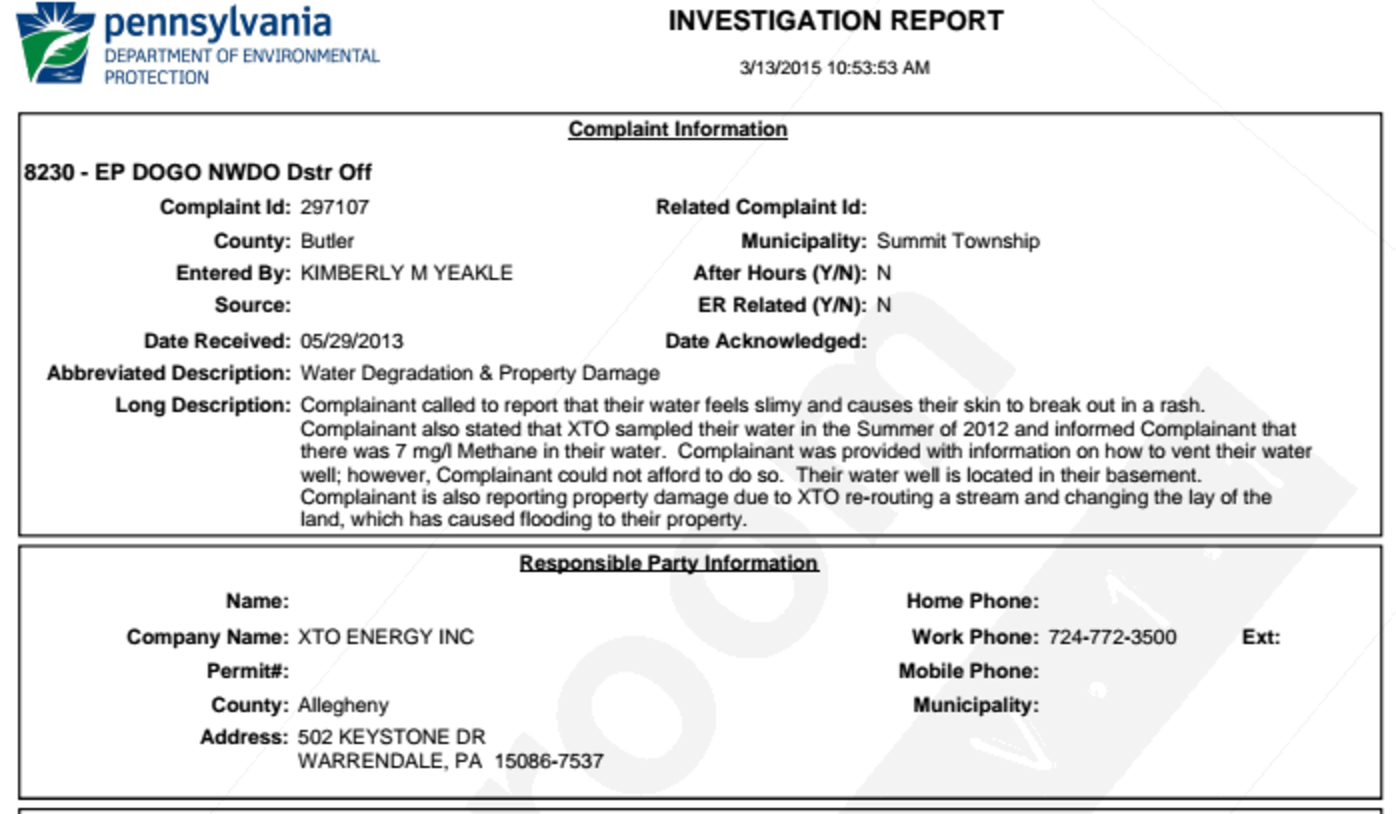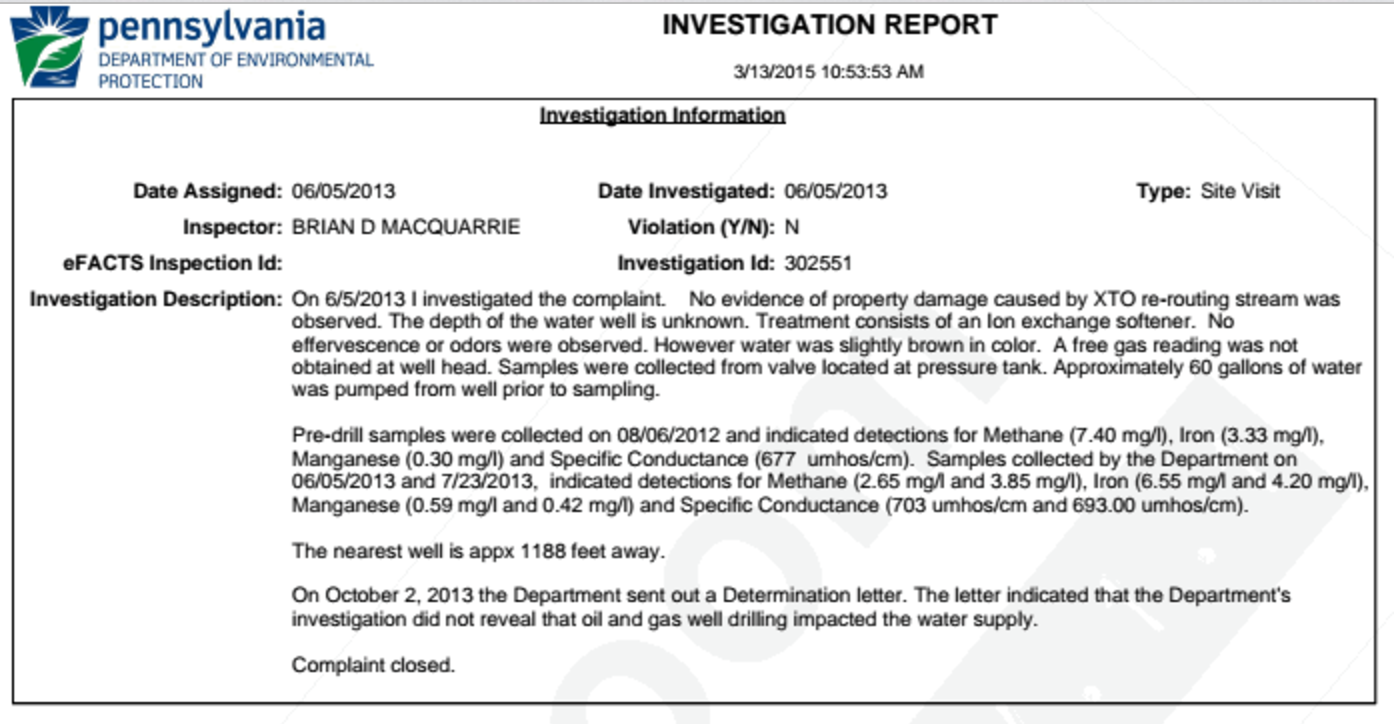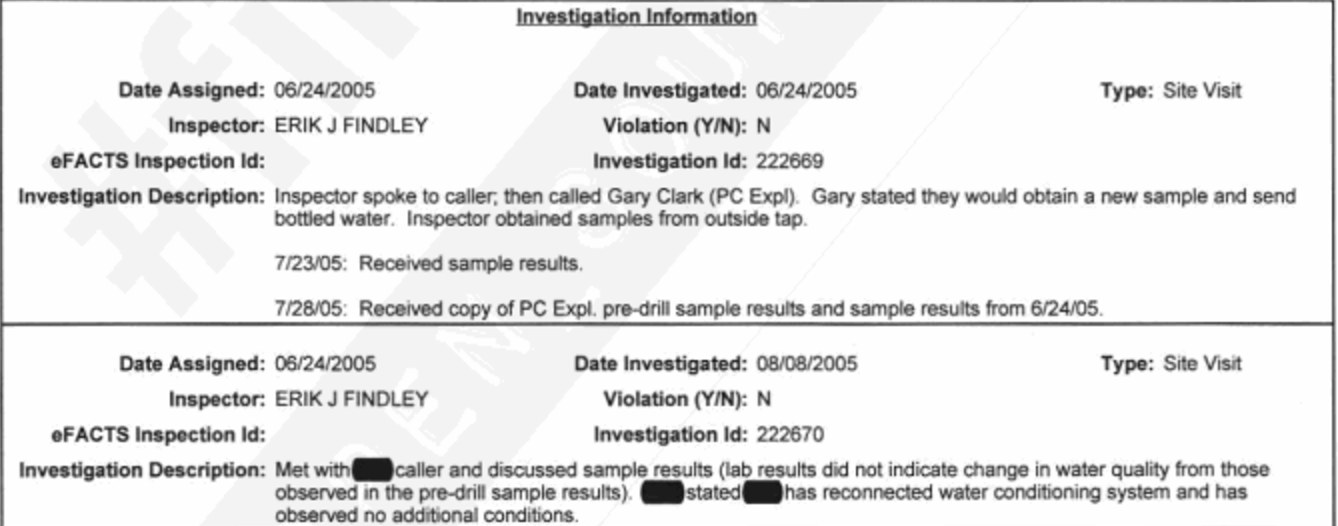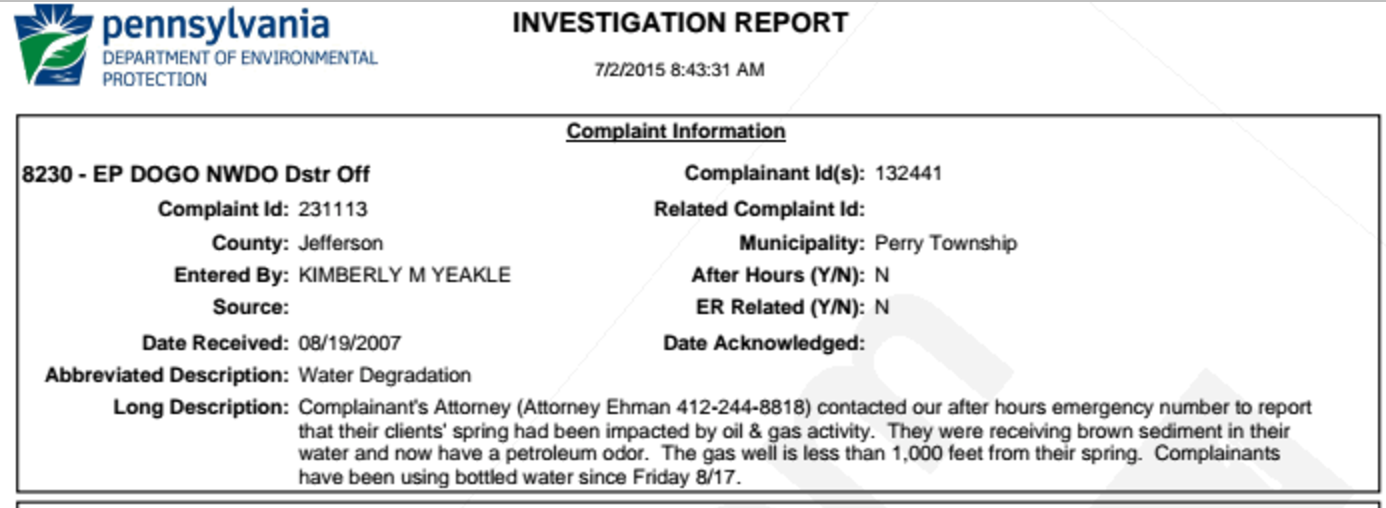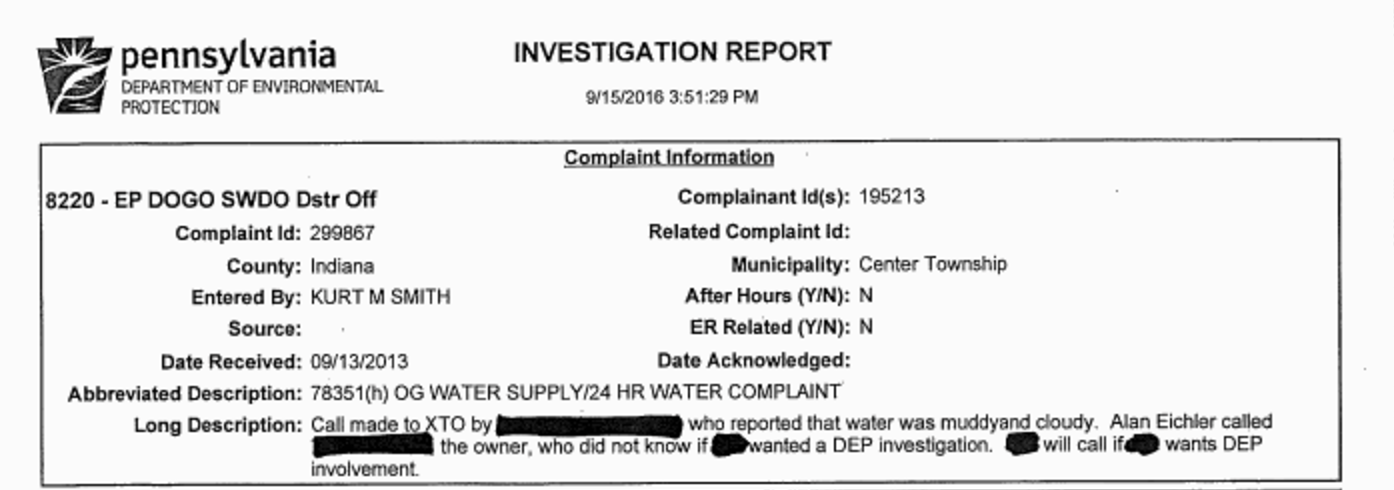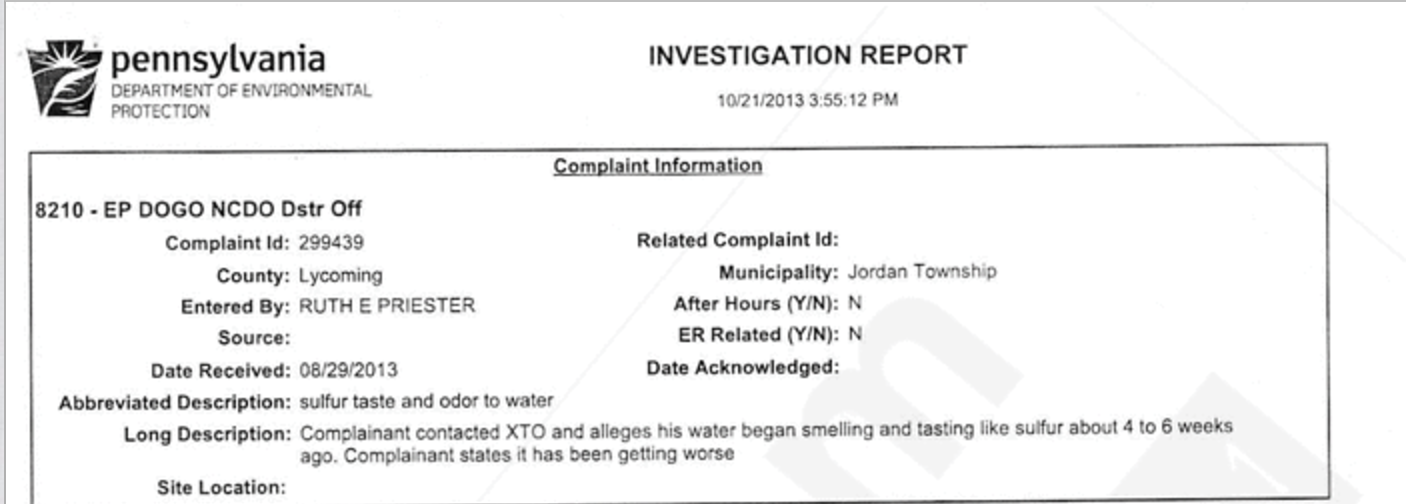The investigative journalism outlet Public Herald documented that ExxonMobil subsidiary XTO Energy has been the subject of 176 citizen complaints in Pennsylvania, many of them drinking water-related. The state is home to the Marcellus Shale basin, the most prolific field for obtaining natural gas via hydraulic fracturing (‘fracking”) in the U.S. and an early hotbed of debate on fracking’s potential threats.
In its investigation, the Pennsylvania-based publication spent three years digging up complaints submitted by the state’s citizens to the Pennsylvania Department of Environmental Protection (DEP). With documents spanning from 2004–2016, the complaints previously have been concealed from the public, and Public Herald says they show “evidence of widespread and systemic impacts” of fracking on water in the state.
A DeSmog review of files housed on the investigation’s document-hosting website, PublicFiles.org, shows dozens upon dozens of these wells were owned by XTO. The finding comes as President Donald Trump’s nominees for U.S. Secretary of State, recently retired ExxonMobil CEO Rex Tillerson, and U.S. Environmental Protection Agency Administrator, Oklahoma Attorney General and EPA antagonist Scott Pruitt, await full U.S. Senate floor hearings and eventual confirmation votes.
At his U.S. Senate Committee on Foreign Relations hearing, Tillerson said he supported the use of U.S. oil and gas exports as a geopolitical tool.
Exxon bought XTO as a wholly owned subsidiary in 2009 and said that the purchase would “enhance Exxon Mobil’s position in the development of unconventional natural gas and oil resources.” Indeed, Exxon quickly became and still is the top producer of shale gas in the U.S.
One of Exxon’s liquefied natural gas export projects, Golden Pass LNG, which is co-owned with Qatar Petroleum, reported in March 2016 that it will receive gas from the Transco Pipeline system. Transco, as DeSmog reported in 2014, will feed Marcellus Shale gas to Gulf of Mexico-based export facilities like Golden Pass.
As a company, Exxon lobbied on behalf of liquefied natural gas (LNG) exports in quarter two and quarter four of 2016. Golden Pass got a key permit from the Obama administration in December. But what kind of impacts are these projects leaving behind in Pennsylvania and other fracking sites?
Complaints Primer
“In Pennsylvania, the power over fracking rests in the hands of the Department of Environmental Protection (DEP). When residents observe a problem, they call the Department to report it,” wrote Public Herald in explaining the citizen complaint process (and also publishing the state’s manual on how to file a complaint). “That call gets recorded as a ‘complaint’ as required by Chapter 58 § 3218 of the state’s oil and gas law.”
Between 2013–2016, Public Herald conducted 50 file reviews at DEP‘s offices and tracked down 6,819 complaint cases files. On December 30, 2016, DEP gave Public Herald an updated spreadsheet showing that 9,442 complaints have been filed between 2004–2016 and thousands of these center around water contamination complaints.
“Of the complaint total, 4,108 cases are categorized by DEP as ‘water supply’ complaints,” reported the Herald. “However, this is much lower than the actual number involving drinking water supplies. Hundreds of additional cases are categorized by DEP as gas migration, spill response, pollution, or leaking wells which can include impacts to water.”
On December 13, DEP told the public that only 284 water supplies complaints have been made by Pennsylvania’s citizens, and the DEP did not list companies in doing so. A look at the complaints shows that in the vast majority of cases, the file is closed and the complaint dismissed.
Complaints Against XTO
On the campaign trail, Trump often repeated a version of how U.S. jobs in Michigan have moved to Mexico and Michigan’s water — referring to Flint, Michigan’s water crisis — is contaminated.
Donald Trump Canton, Ohio_001 Flint by DailyPolitics
“It used to be, think of this, is this true? It used to be cars were made in Flint, and you couldn’t drink the water in Mexico,” Trump said on September 15 in Canton, Ohio. “Now, the cars are made in Mexico, and you can’t drink the water in Flint! Oh, I hate to say it, but it’s true.”
This could also be the case for Pennsylvania’s gas, much of which could soon be exported to the global market via coastal LNG terminals, while its water at home remains contaminated for many of its citizens.
DeSmog has highlighted five examples of the XTO complaints, which, along with the company’s lack of penalization, illuminate the issue particularly well.
1.) A May 2013 complaint shows that a citizen living in Butler County, Pennsylvania, had “slimy” feeling water and previously was informed by XTO that he or she had seven milligrams per liter of methane laced in his or her drinking water. A DEP inspector went to the scene and discovered brown-colored water, but determined it to be naturally occurring and closed the investigation.
2.) A June 2005 complaint filed by a citizen in Upper Turkeyfoot Township, made before the Exxon buyout of XTO, shows him or her telling DEP that his or her water has turned “yellow in color and greasy in touch.” DEP shipped the citizen bottled water, but did not conclude there to be any linkage between XTO‘s drilling activity and fouling of the water.
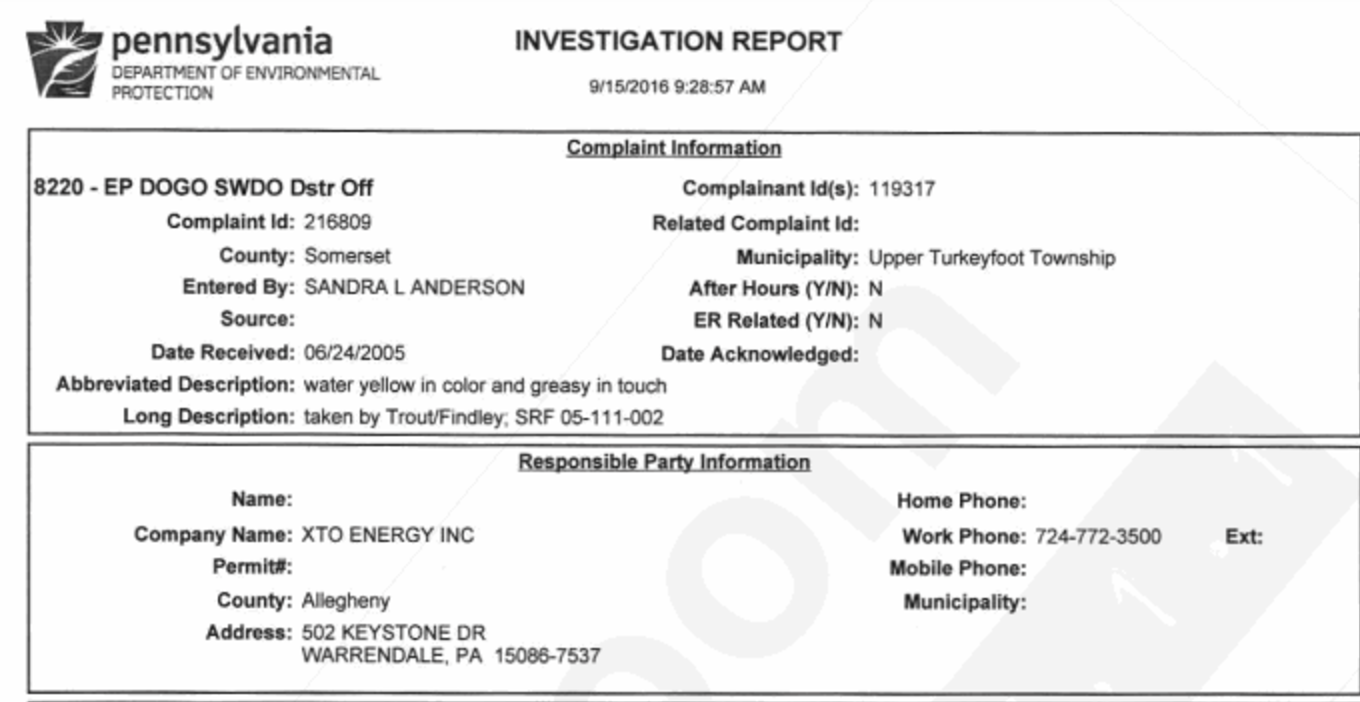
3.) In 2007, again made before the Exxon buyout of XTO, a document indicates that at the time, 25 complaints had been filed against XTO. The one in question in this case pertained to a well in Perry Township and came from a citizen who said he or she was “receiving brown sediment” in the water which smelled like petroleum. That complainant had a gas well less than 1,000 feet away from his or her drinking water source.
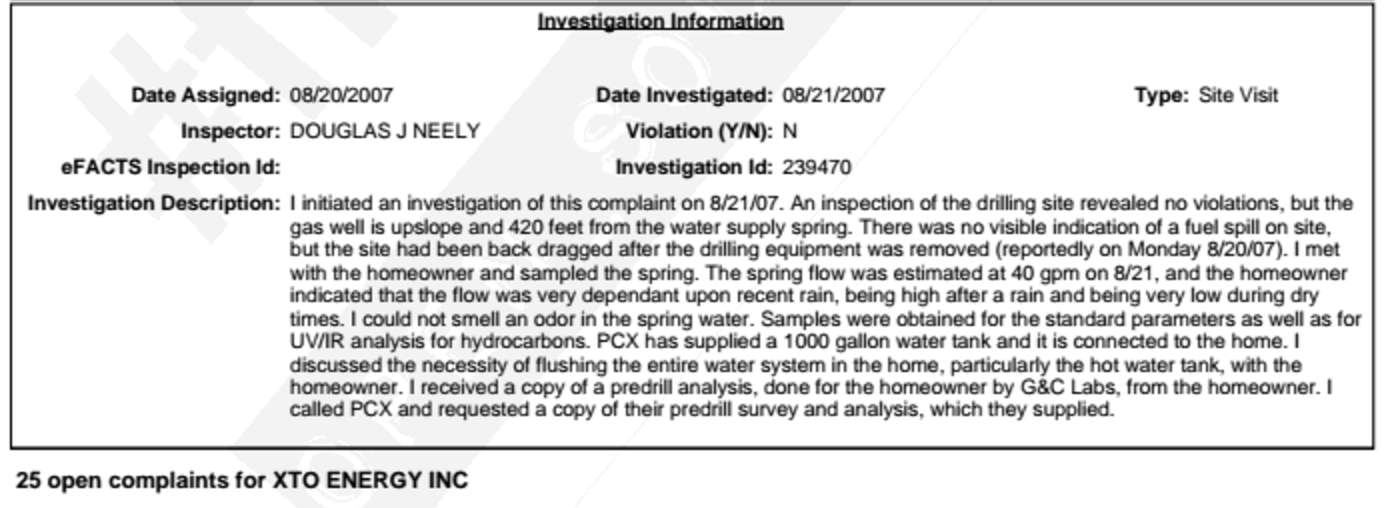
4.) A 2013 complaint shows a citizen reporting that his or her water became “muddy” and “cloudy” from what he or she suspected was XTO‘s drilling activity in Center Township. After making the initial complaint, the citizen went silent, which may mean he or she signed a legal non-disclosure agreement with XTO.
5.) A similar 2013 complaint filed by a citizen living in Jordan Township shows the citizen saying his or her water smelled like “rotton egg sulfur odor” and had been that way for four to six weeks. When DEP contacted the complainant, he or she did not respond, again suggesting a possible signing of a non-disclosure agreement contract with XTO.
“This is For Real”
John Stolz, the Director of the Center for Environmental Research and Education at Duquesne University and a professor of environmental microbiology, reviewed Public Herald’s documents and came to a grave conclusion.
“A big part of the problem is that [officials] don’t take these complaints seriously,” Stolz told Public Herald. “But when you go out and you meet people … you realize that this is for real. And until that attitude changes in Harrisburg [the state’s capital city], we’re going to continue seeing these complaints swept under the table.”
In December 2016, the Environmental Protection Agency (EPA) released a report concluding that fracking can harm water supplies and outlined the circumstances when the impacts can be “more frequent or severe.” It did remove a controversial claim that appeared in an earlier draft and press releases stating the EPA found “no evidence” of “widespread, systemic impacts” on America’s drinking water supplies from fracking, a claim which the EPA‘s Scientific Advisory Board described as unsupported.
However, prospects for addressing potential fracking risks and water quality violations don’t look much better at the federal level either at this point, with the Trump administration’s apparent plans to gut the EPA and expand both U.S. fossil fuel extraction and exports.
Joshua Pribanic, Editor-in-Chief and Co-founder of Public Herald, told DeSmog how he thought state and federal agencies should handle the issue:
“U.S. energy policy on fracking is a two-sided story where on one hand politicians and companies like Exxon have promised American farmers that fracking would create energy independence, then they turned around and signed deals to export that farmer’s oil and gas overseas. Meanwhile, too often, farmers were left with reduced royalty checks, contaminated drinking water, and acres of unusable land.
In Pennsylvania, we now know … that the PA DEP suppressed complaints from thousands of residents who said fracking impacted their drinking water. And, we also know the US EPA downplayed risks of fracking to drinking water in their national study — excluding these thousands of complaints. In both cases, state and federal agencies have deceived the public about the risks of fracking to the nation’s drinking water supplies. The implications are people are being impacted every day — they’re losing their drinking water — and Congress should open an investigation on both agencies immediately so the truth can be discovered.”
Main image: Fracking site in Warren Center, Pennsylvania Credit: Ostroff Law, CC BY 3.0
Subscribe to our newsletter
Stay up to date with DeSmog news and alerts


